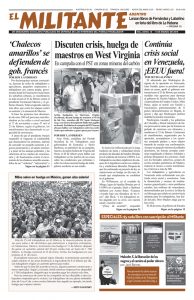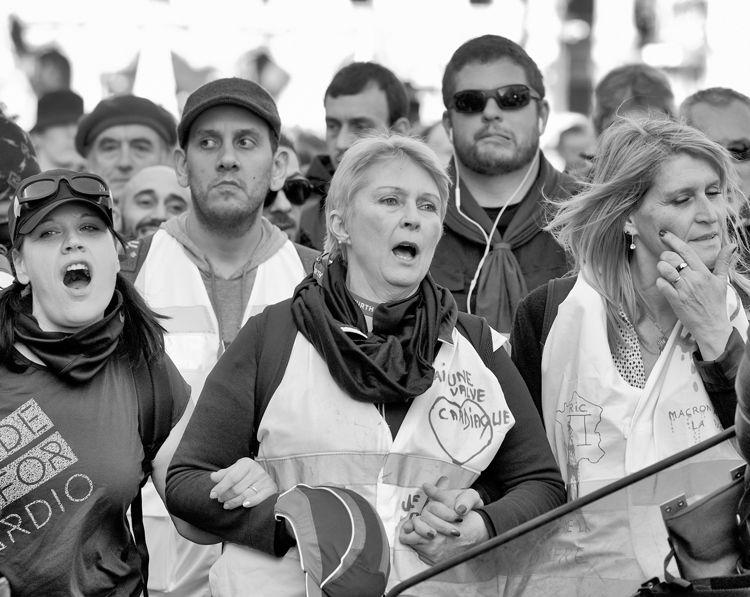For the 15th consecutive week, tens of thousands of workers and farmers, small businesspeople and self-employed, from provincial France to outer city suburbs, rallied in cities around the country Feb. 23 against President Emmanuel Macron and the French government. They are demanding higher wages, an end to attacks on their livelihoods and for Macron to resign.
While actions have declined from some 300,000 in the streets and at traffic stops nationwide Nov. 17 to a government estimate of some 47,000 Feb. 23, they have shown staying power.
Despite the French president backing down from the onerous “green” fuel tax that triggered the popular protests, as well as conceding a small increase to some pensions and the minimum wage; despite heavy police assaults and a barrage of media and official slanders against the yellow vest movement as “violent,” “anti-Semitic” and even “fascist,” the protests retain popular support and are a topic of broad working-class discussion.
Masses of men and women from nowhere, not organized by established political parties and unions, erupted in protest. They were reacting to the serious crisis they face caused by the workings of the dog-eat-dog capitalist profit system. And they despise a government that they increasingly see rules for the rich and treats them with nothing but disdain.
“It’s a very humanist movement and we’re doing this for everyone,” Madeleine, a 33-year-old unemployed worker, told Reuters Feb. 16. Many say for the first time they have found “fraternity” — that is, working-class solidarity — in these actions. They are like working people elsewhere branded as “deplorables” or “populists” — from the United States to Britain, Italy to eastern Europe.
Hoping to get the yellow vests off the streets, Macron in January called for a “great national debate.” This “great debate is mostly a great masquerade,” Mathieu Styrna, a 36-year-old carpenter from northern France told Agence France-Presse Jan. 26.
Macron’s “base is France’s meritocratic elite, the people who have benefited from the same global trends that have left most of the country behind,” Pascal-Emmanuel Gobry wrote in the Wall Street Journal Feb. 22. And the yellow vest movement has instilled deep fear in French ruling-class circles and their hangers-on.
Many children “are now open and want to understand why their parents are in this movement,” Natasha, a protester at Pontault-Combault near Paris, told the media. “They get more interested in politics. I think we need to explain because that’s not the kind of stuff they learn in school.”
Under cover of the protests, a tiny minority of anarchists, other ultralefts and a handful of frustrated protesters have been damaging property and clashing with police. Media coverage of this has given the rulers ammunition to attack the massive, peaceful demonstrations as violent. Macron authorized the police to clamp down, using riot cops, tear gas, rubber bullets and water cannons. Numerous people have been injured, often seriously.
A government-promoted French nationalist “red scarves” march against “violence” Jan. 27 drew thousands behind chants of “Yes to democracy, no to revolution!” One reporter noted it was “noticeably more middle-class” than the “yellow vests.”
Anti-Semitic smear
Rightist French academic Alain Finkielkraut, who is Jewish, is widely hated by workers for his anti-working-class views. He was spotted near the Feb. 16 march in Paris. Some individuals called out “Fascist!” “Zionist” and “Palestine! Go back to Israel!” as most marchers just ignored him.
French officials and the media seized on this incident, linking it to a supposed recent spike in anti-Jewish, pro-Nazi graffiti and vandalism, to try to tarnish the yellow vests with accusations of anti-Semitism. This fits with their efforts to paint the protesters as a less “smart” group of outcasts from polite society that need to be controlled.
“The yellow vest movement has provoked a reaction that has many precedents,” Serge Halimi and Pierre Rimbert wrote in an article entitled “France’s Class Wars” in the February Le Monde Diplomatique. When “there is undisguised class struggle, everyone has to choose sides,” the article says, “even the most liberal, educated and distinguished people drop any pretence of peaceful coexistence. Fear robs them of their composure.”
During the Paris Commune in 1871, the first time in history a workers’ uprising had formed a government, Halimi and Rimbert explain, the poet Leconte de Lisle was horrified by the revolution, calling the masses “this league of all the underclass, all the useless people.” Similarly, author Gustave Flaubert said the “first remedy should be to end universal suffrage,” and novelist Emile Zola said the slaughter of 20,000 Communards by the French army was “a horrible necessity to calm some of their fevers.”
Halimi and Rimbert compiled a litany of today’s French meritocrats who have reacted to the yellow vests with the same scorn. They quote novelist and former editor of Le Figaro Fanz-Olivier Giesbert, who called the yellow vests “hordes of losers and looters” who are “consumed by resentment as though by lice.”
Rightist intellectual Pascal Bruckner thanked cops who brutally attack demonstrators, saying their assaults and bloodshed had “calmly saved the Republic” from “the ‘barbarians’ and the ‘hooded mob.’” Sounding like one of his U.S. counterparts today, meritocrat Bernard-Henri Levy called the yellow vests “white trash.”


